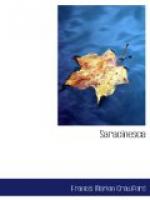“You must be lonely since Don Giovanni has gone upon his travels again,” she said.
“That is the reason I go out,” said the Prince. “It is not very gay, but it is better than nothing. It suggests cold meat served up after the dessert; but when people are hungry, the order of their food is not of much importance.”
“Is there any news, Prince? I want to be amused.”
“News? No. The world is at peace, and consequently given over to sin, as it mostly is when it is resting from a fit of violence.”
“You seem to be inclined to moralities this evening,” said Donna Tullia, smiling, and gently swaying the red fan she always carried.
“Am I? Then I am growing old, I suppose. It is the privilege of old age to censure in others what it is no longer young enough to praise in itself. It is a bad thing to grow old, but it makes people good, or makes them think they are, which in their own eyes is precisely the same thing.”
“How delightfully cynical!”
“Doggish?” inquired the Prince, with a laugh. “I have heard it said by scholars, that cynical means doggish in Greek. The fable of the dog in the horse’s manger was invented to define the real cynic—the man who neither enjoys life himself nor will allow other people to enjoy it. I am not such a man. I hope you, for instance, will enjoy everything that comes in your way.”
“Even the cold meat after the dessert which you spoke of just now?” asked Donna Tullia. “Thank you—I will try; perhaps you can help me.”
“My son despised it,” said Saracinesca. “He is gone in search of fresh pastures of sweets.”
“Leaving you behind.”
“Somebody once said that the wisest thing a son could do was to get rid of his father as soon as possible—”
“Then Don Giovanni is a wise man,” returned Donna Tullia.
“Perhaps. However, he asked me to accompany him.”
“You refused?”
“Of course. Such expeditions are good enough for boys. I dislike Florence, I am not especially fond of Paris, and I detest the North Pole. I suppose you have seen from the papers that he is going in that direction? It is like him, he hankers after originality, I suppose. Being born in the south, he naturally goes to the extreme north.”
“He will write you very interesting letters, I should think,” remarked Donna Tullia. “Is he a good correspondent?”
“Remarkably, for he never gives one any trouble. He sends his address from time to time, and draws frequently on his banker. His letters are not so full of interest as might be thought, as they rarely extend over five lines; but on the other hand it does not take long to read them, which is a blessing.”




